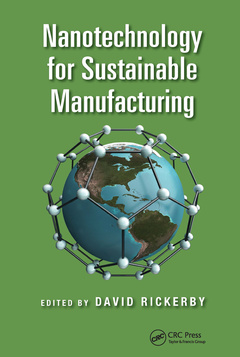Description
Nanotechnology for Sustainable Manufacturing
Coordinator: Rickerby David
Language: English
Subject for Nanotechnology for Sustainable Manufacturing:
Keywords
Fuel Cells; Lithium Ion Batterie; Nanotechnology; Life Cycle Assessment; Nanomaterial; Lithium Ion Batteries; Sustainability; Transition Metal; Energy; Lithium Ion; Resource efficiency; Power Conversion Efciency; Manufacturing industry; Lca; CH 2O; Low Temperature Fuel Cells; SODIS; Photocatalytic Disinfection; HIPCO PROCESS; Photocatalytic Inactivation; Cellulose Nanocrystals; NCC; Quantum Dot; Improved Drinking Water Sources; Uva Dose; MEA; SWCNT; RFID System; Thin Lm Technologies; Oxygen Mobility; Energy Density
Publication date: 12-2021
· 15.6x23.4 cm · Paperback
Publication date: 06-2014
306 p. · 15.6x23.4 cm · Hardback
Description
/li>Contents
/li>Readership
/li>Biography
/li>
Nanotechnology has the potential to play an important role in increasing the sustainability of a wide range of industrial sectors. Nanomaterials could contribute to more sustainable manufacturing through cleaner, less wasteful production processes and can substitute conventional materials, leading to savings in raw materials and energy. Nanotechnology for Sustainable Manufacturing discusses recent progress in the areas of energy and materials efficiency related to resource savings and conservation of raw materials, which are drivers for the application of nanotechnology in the industrial setting.
Written by leading experts from Europe, North America, Asia, and Australia, the book provides an innovative perspective by establishing connections between the subject areas associated with nanotechnology and by bridging the academic and industrial research gap. The topics covered include electronics, agrifood, aerospace, pulp and paper manufacturing, batteries, catalysts, solar energy, fuel cells, drinking water, and construction materials.
The chapters offer insights into the diverse industries that are currently or likely to be impacted by developments in nanotechnology and nanomaterials. They cover applications such as nanotechnology for alternative energy generation, improving water quality, and novel uses in agriculture and forest products. The book also addresses the use of life-cycle analysis for assessing the sustainability of nanotechnology-based products and processes.
Introduction. Nanotechnology in Electronics. Photovoltaics and Nanotechnology: From Innovation to Industry. How Nanotechnologies Can Enhance Sustainability in the Agrifood Sector. Biological Production of Nanocellulose and Potential Application in Agricultural and Forest Product Industry. Applications of Nanotechnology in Aerospace. Applications of Nanomaterials in Fuel Cells. Nanostructured Metal Oxide Catalysts. Solar Photocatalytic Drinking Water Treatment for Developing Countries. Applications of Nanotechnology in the Building Industry . Anticipatory Life-Cycle Assessment of SWCNT-Enabled Lithium Ion Batteries. Life-Cycle Assessment of Nanotechnology-Based Applications. Index.
David G. Rickerby, PhD, is a senior scientific officer in the Institute for Environment and Sustainability at the European Commission Joint Research Centre, Ispra, Italy. After earning a doctoral degree from the University of Cambridge, he carried out postdoctoral research at the Pennsylvania State University. His present research interests involve evaluation of the potential risks and benefits of nanotechnologies, including development of risk assessment tools and methodologies. He was one of the group of international experts who coauthored a chapter on nanotechnology and the environment for the UNEP GEO Year Book and is a member of the OECD Working Party on Manufactured Nanomaterials, Steering Group 9 on the Environmentally Sustainable Use of Nanotechnology.



